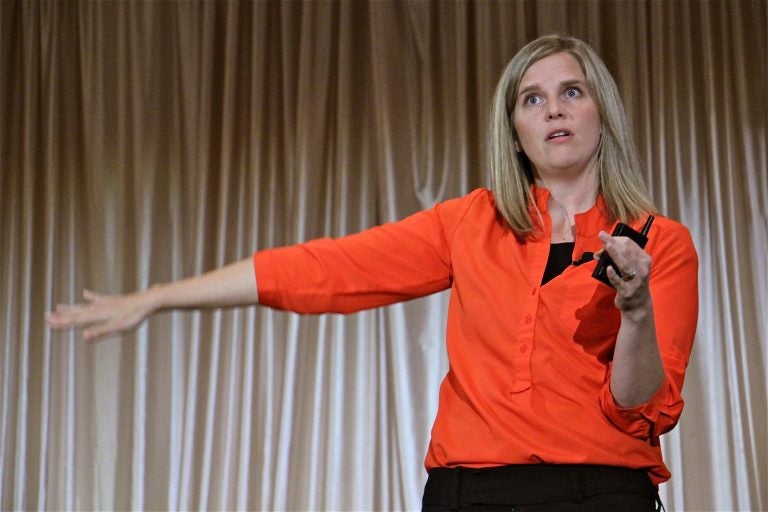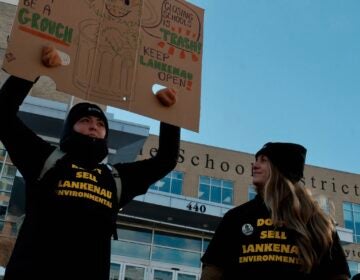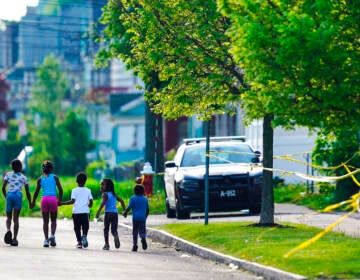At Delco ‘Safe Schools’ event, lessons from Sandy Hook shooting
A woman who lost her daughter in the Connecticut elementary school massacre still steels herself to tell the story. She does so to help others prepare for the next tragedy.

Alissa Parker, whose daughter Emilie died in the shooting at Sandy Hook Elementary School, talks about ways to improve school safety during a conference in Drexel Hill. (Emma Lee/WHYY)
In the weeks and months after a tragic attack such as the mass shooting in Las Vegas, grieving family members will sift through the day’s events, thinking “what if?”
Alissa Parker knows that feeling well.
She lost her daughter Emilie in the 2012 shooting at Sandy Hook Elementary School in Newtown, Connecticut, where 20 children and six school staff lost their lives. Out of her grief came a crusade for school safety.
At a “Safe Schools” summit hosted by the Delaware County district attorney’s office Tuesday, Parker walked through the events of the day her daughter died, pointing out all the missed opportunities to deter shooter Adam Lanza and support grieving parents.
But, before launching into her story, she took a moment to put her feelings aside.
“I have to kind of train my brain to go into a place where I just turn off my emotions a little bit,” she told the more than 150 people assembled in a rented ballroom in Drexel Hill.
For the next hour, Parker recounted the events of Dec. 14, 2012, from dropping her first-grade daughter at the bus stop, to rushing through a gauntlet of reporters as she tried to flee the elementary school in grief.
At each step, she cued school administrators in the audience to think about their own spaces. At Sandy Hook, classroom doors that locked from the inside could have stalled or discouraged the active shooter, she pointed out.
Better communication inside the school also could have alerted teachers to the danger at hand, before the shooter showed up at their door.
A lockdown “was supposed to be announced by the front office,” she said. “But, because the shooter went into that room, that alarm was not activated. They were not in a position to announce anything over the PA system, so we really had our hands tied.”
After the shooting ended, poor communication between law enforcement and school officials meant Parker and other parents received conflicting messages about their children’s whereabouts. Huddled in a conference room, Parker finally received the bad news from Gov. Dannel Malloy, who thought they already knew.
“I remember raising my hand and saying, ‘Well what about the children taken to the hospital?’ And he looked confused. He kind of hesitated for a moment and said, ‘Those children have since expired.’”
And the grief didn’t end there. After such a tragedy, media attention and the gifts that flowed to the bereaved created new problems, and families need to be continually reminded of what resources are available for them to seek counseling and support.
The “Safe Schools” event went on to touch on drug abuse, appropriate communication between teachers and students, and local emergency service providers — the more commonplace school safety issues.
But part of Parker’s message is this: A mass shooting can happen. She said her intention is not to blame her daughter’s school, but to help others plan for the worst.
WHYY is your source for fact-based, in-depth journalism and information. As a nonprofit organization, we rely on financial support from readers like you. Please give today.





